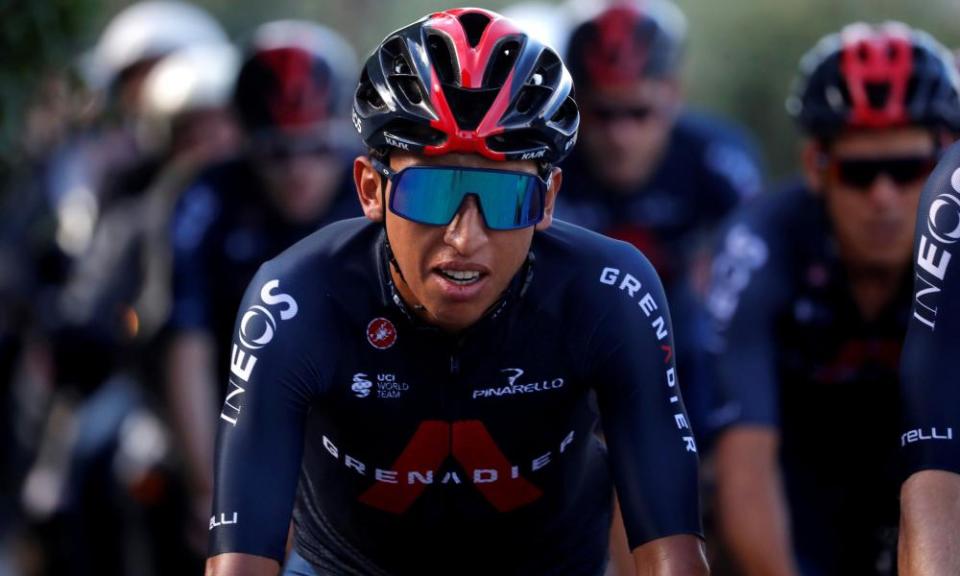Tour de France set for Grand Départ shrouded in fear and uncertainty

Rarely, if ever, has the modern Tour de France started in such uncertain conditions and shrouded by so many tensions. The 2020 edition of the old race, first staged in 1903, rolls out of Nice on Saturday facing perhaps its greatest challenge ever in the Covid-19 pandemic.
There will be bubbles, face masks, distancing, but the frightening reality is that the virus is once again on the march in Europe. The all-powerful Tour de France organisation can close cities, airports and, almost, move mountains, but it can’t control all of the people all of the time, even if they ardently love cycling. With infection rates rising across France, the question is just how long can the Tour and the French government keep the show safe, healthy and on the road.
Related: Tour de France 2020: full team-by-team guide | William Fotheringham
Already, the tough stance adopted by both race promoters and the sport’s governing body, the UCI, has softened. Before the convoy gathered in Nice for this year’s Grand Départ, there was a “two strikes and you’re out” rule in place. If teams had two positive Covid-19 tests in a week within the protective bubble of their entourage, then they were promptly sent home.
That policy has already been tested after the Lotto-Soudal team had exactly that experience this week with their support staff, but with most teams railing against such draconian measures, the UCI has now amended the protocol to apply specifically to each team’s riders, rather than staff.
“In the case of two or more riders from the same team testing positive for Covid-19 within a period of seven days at a Grand Tour, the UCI will give the event organiser authorisation to announce the withdrawal of the team, on the condition however, that the global medical assessment carried out confirm the positive cases,” the UCI said.
In a caveat that almost invites further controversy over the requirement for a second test, the statement added: “The organiser must do everything possible – but without being liable – to proceed as far as possible with a complementary test and a serological analysis before the following stage.”
Teams, already on edge, not just over false positives, but over their own health as they travel around France, their protection from the public and the demands of somehow arriving in Paris on 20 September free of contact with the virus, are also racing for their survival, with some sponsors — notably McLaren who will end their investment in the Bahrain-McLaren team at the end of the year — already leaving the sport.
Dave Brailsford, however, in charge of the Ineos Grenadiers team led by defending champion Egan Bernal, doesn’t see things that way. “I don’t buy that the economy [of cycling] would be down the pan and that it’s never going to bounce back,” he said of the prospect of the Tour being stopped by Covid-19. “There is a financial component but it’s not the end of cycling,” Brailsford added. More easily said, perhaps, when you are running one of billionaire Sir Jim Ratcliffe’s pet projects rather than the B&B Hotels-Vital Concept lineup.

But, set against this context of fear and loathing, and no small amount of paranoia, what about the race itself? On paper, it looks dynamic, exciting and dramatic, almost from the very first kilometre. The Tour director, Christian Prudhomme, talks often of cycling’s need to cater to “generation zapping”, and of making the race less soporific, more friendly to a younger audience fixated by social media and soundbites.
The drama comes quickly this year, with the opening weekend including five categorised climbs in 48 hours, two of which, the Col de la Colmiane and the Col de Turini, both on stage two, top 1,500 metres. If the racing is fast and furious, as it has been since this year’s post lockdown restart, then there will be significant damage done to many in the peloton.
The first summit finish comes on stage four, at Orcières-Merlette ski station, overlooking Gap, a climb on which Spain’s Luis Ocaña rode into folklore in 1971, by leaving his great rival Eddy Merckx far behind. Two days later, after the race has crossed the Rhône valley, there is another mountain-top showdown, on Mont Aigoual in the Cévennes, making it a breathless opening week.
Two arduous but moderate stages in the Pyrenees are followed by the first rest day and a transfer — by bus for the riders, rather than as usual by air — to the Charente and a circuitous 10th stage, between Île d’Oléron and the Île de Ré that, if the wind blows off the Atlantic, may prove as chaotic as any of the mountain stages.
It may also prove to be a watershed moment for the 2020 Tour, with some in the convoy speculating that the Tour’s halfway point may be the cut-off for awarding a final yellow jersey, should the Covid crisis worsen and the race be stopped by the French government.
Related: Tour de France in doubt after Covid red alert issued before Grand Départ in Nice
The route then traverses the Massif Central and recrosses the Rhône before a triptych of mountain stages in the Vercors, Savoie and Jura regions. But the organisers are clearly hoping for a cliffhanger with a mountain time trial to La Planche des Belles Filles, scheduled for the final Saturday, prior to the usual grand finale on the Champs Elysées.
The climate of fear may evaporate once the race hits the road, with restricted access for the public, the gendarmerie in place and the racing taking centre stage. One thing’s for sure: hanging around in Nice, masked up, fretting over testing and spending all their time on Zoom and WhatsApp, waiting for the Tour to begin, doesn’t seem to be doing anybody’s nerves any good.

 Yahoo Sport
Yahoo Sport 





































